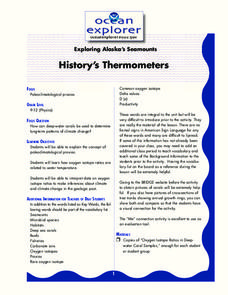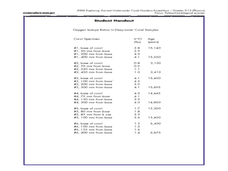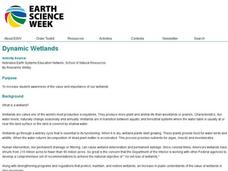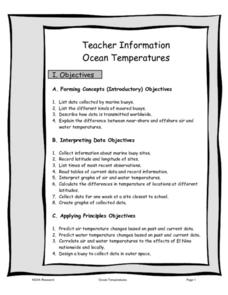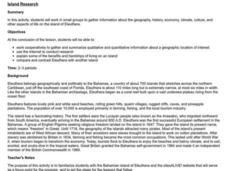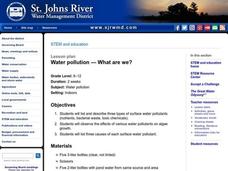Curated OER
History's Thermometers
Students explain the concept of paleoclimatological proxies. In this oxygen isotope lesson, students interpret data and make inferences about climate changes in the geologic past.
Curated OER
I'll Stay Here if It Kills Me!
Students examine coastal ecology. In this coastal resource lesson, students engage in several activities designed to examine the natural and cultural resources of coastal areas. Students then establish regulations to keep coastal areas...
Curated OER
How can deep-water corals be used to determine long-term patterns of climate change?
Students explore the concept of paleoclimatological proxies. In this paleoclimatological proxies lesson, students explain isotope ratios in deep water coral samples. Students write a paragraph about global climate change as it effects...
Curated OER
Dynamic Wetlands
Students construct and observe a model of two different types of wetlands. In this wetlands lesson, students create a model of a wetland with constant drainage and a wetland that maintains a well-saturated soil. Students observe and...
Curated OER
Water Supply and Water Uses
A large variety of topics are given in this PowerPoint about water. Some come from a scientific point of view, some regarding recreation, some for domestic use, and others from hydroelectricity. A teacher could choose to use this...
Curated OER
Failing Ecosystems: Haiti and the Caribbean
Ninth graders study the impact that climate has on the land. They discuss how deforestation leads to erosion and soil damage and how trees and vegetation help to stabilize the land. They draw a large map of the Caribbean and show Haiti...
Curated OER
BATS: NEED NECTAR, WILL TRAVEL
Students play the role of nectar feeding bats on their annual migration
and try to avoid the different hazards that hinder their progress. They describe the annual migration of long-nosed bats including key elements such as: where the...
Curated OER
What Was for Dinner?
Students examine energy obtaining strategies that are used by organisms in deep reef communities. In this ocean activity students complete an isotope activity.
Curated OER
High School Marine Science at its Best: Research Collaboration
Students formulate a more accurate understanding of the true nature of scientific research and the challenges and rewards of field investigations.
Curated OER
Breaking Away (Or Not...)
Students compare and contrast common reproductive strategies used by benthic invertebrates. They describe the most common reproductive strategies among benthic invertebrates on a seamount, and explain why these strategi
Curated OER
Great Barrier Reef
Ninth graders read text imbedded in this plan and find the answers to 3 questions: Why is the Great Barrier Reef one of the natural wonders of the world? What value does the reef offer Australia's economy? How is the reef being damaged?
Curated OER
The Sights and Sounds of Orcas
Students investigate the orca whale. They participate in an online Webquest, listen to whale vocalizations online, answer discussion questions, and locate and read newspaper articles on marine mammals and orca whales.
Curated OER
Life on the Edge: Exploring Deep Ocean Habitats Cool Corals
High schoolers research the basic morphology of Lophelia corals and polyps to determine the significance of these organisms. They detail the reasons that biological communities are focusing on the Lophelia corals as major conservation...
Curated OER
Ocean Temperatures
Learners list data collected by marine buoys and the different kinds of moored buoys. They describe how data is transmitted worldwide. They explain the difference between near shore and offshore air and water temperatures.
Curated OER
Whale of a Tale
Students apply problem solving techniques to answer a question. After reading a passage, they compare and contrast three species of whale in a quantitative fashion.
Curated OER
Great Barrier Reef-Guarding Nemo
Learners explore the Great Barrier Reef. In this environmental stewardship instructional activity, students conduct research regarding the Great Barrier Reef and examine methods to preserve the Reef. Learners apply the RAFT method to...
Curated OER
So, What's it Doing Today?
Students describe short-term variations in oceanographic parameters in the Gulf Stream. In this ocean habitats lesson students use satellite imagery to obtain information in the Gulf Stream.
Curated OER
Hazardous Chemicals in Your Neighborhood
Students examine the effect of hazardous chemicals on humans. They discover how the chemicals are cleaned up and the facilities in their neighborhood. They identify federal and local agencies that oversee environmental hazards
Curated OER
Land Use Decision
Students identify social and ecological considerations where human uses of land and trees conflict with each other and ecosystem needs, and describe importance of land-use management and planning through role play.
Curated OER
Island Research
Students will work in small groups to gather information about the geography, history, economy, climate, culture, and other aspects of life on the island of Eleuthera. Lesson contains adaptations for all levels.
Curated OER
What Are We?
Students list and describe three types of surface water pollutants. They observe the effects of various water pollutants on algae growth. Three causes of each surface water pollutant is listed.
Curated OER
Do We Control Nature, or Does Nature Control Us?
Student examine the theme of man versus nature in art. In this man versus nature lesson plan, students examine various pieces of art and discuss the theme as it is depicted. They discuss whether the themes shown in the artwork are...
Curated OER
Dirty Mud
Students examine geological information to study benthic marine habitats. For this watershed project, students examine wetland habitats and land uses in a watershed. They will use geological information to discuss the impact of pollution...
Curated OER
The Future of the Arctic National Wildlife Refuge
Students research the governments role is preserving the Arctic National Wildlife Refuge. They discuss the proponents and the opponents side of the issue.


